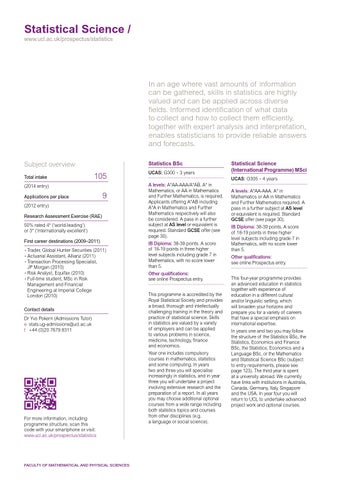Statistical Science / www.ucl.ac.uk/prospectus/statistics
In an age where vast amounts of information can be gathered, skills in statistics are highly valued and can be applied across diverse fields. Informed identification of what data to collect and how to collect them efficiently, together with expert analysis and interpretation, enables statisticians to provide reliable answers and forecasts. Subject overview Total intake
Statistics BSc
105
(2014 entry) Applications per place
9
(2012 entry) Research Assessment Exercise (RAE) 50% rated 4* (‘world-leading’) or 3* (‘internationally excellent’) First career destinations (2009–2011) • Trader, Global Hunter Securities (2011) • Actuarial Assistant, Allianz (2011) • Transaction Processing Specialist, JP Morgan (2010) • Risk Analyst, Equifax (2010) • Full-time student, MSc in Risk Management and Financial Engineering at Imperial College London (2010) Contact details Dr Yvo Pokern (Admissions Tutor) e stats.ug-admissions@ucl.ac.uk t +44 (0)20 7679 8311
For more information, including programme structure, scan this code with your smartphone or visit: www.ucl.ac.uk/prospectus/statistics
FACULTY OF MATHEMATICAL AND PHYSICAL SCIENCES
UCAS: G300 • 3 years
Statistical Science (International Programme) MSci UCAS: G305 • 4 years
A levels: A*AA-AAA/A*AB. A* in Mathematics, or AA in Mathematics and Further Mathematics, is required. Applicants offering A*AB including A*A in Mathematics and Further Mathematics respectively will also be considered. A pass in a further subject at AS level or equivalent is required. Standard GCSE offer (see page 30). IB Diploma: 38-39 points. A score of 18-19 points in three higher level subjects including grade 7 in Mathematics, with no score lower than 5. Other qualifications: see online Prospectus entry. This programme is accredited by the Royal Statistical Society and provides a broad, thorough and intellectually challenging training in the theory and practice of statistical science. Skills in statistics are valued by a variety of employers and can be applied to various problems in science, medicine, technology, finance and economics. Year one includes compulsory courses in mathematics, statistics and some computing. In years two and three you will specialise increasingly in statistics, and in year three you will undertake a project involving extensive research and the preparation of a report. In all years you may choose additional optional courses from a wide range including both statistics topics and courses from other disciplines (e.g. a language or social science).
A levels: A*AA-AAA. A* in Mathematics or AA in Mathematics and Further Mathematics required. A pass in a further subject at AS level or equivalent is required. Standard GCSE offer (see page 30). IB Diploma: 38-39 points. A score of 18-19 points in three higher level subjects including grade 7 in Mathematics, with no score lower than 5. Other qualifications: see online Prospectus entry. This four-year programme provides an advanced education in statistics together with experience of education in a different cultural and/or linguistic setting, which will broaden your horizons and prepare you for a variety of careers that have a special emphasis on international expertise. In years one and two you may follow the structure of the Statistics BSc, the Statistics, Economics and Finance BSc, the Statistics, Economics and a Language BSc, or the Mathematics and Statistical Science BSc (subject to entry requirements, please see page 123). The third year is spent at a university abroad. We currently have links with institutions in Australia, Canada, Germany, Italy, Singapore and the USA. In year four you will return to UCL to undertake advanced project work and optional courses.
